- Home
- Mary Downing Hahn
Took: A Ghost Story Page 8
Took: A Ghost Story Read online
Page 8
I gripped her skinny wrists tightly. “Who are you? How did you get my sister’s clothes? Where is she?”
“Let me go, let me go.” The girl twisted and turned. She was so thin I was afraid of breaking her bones, but I couldn’t let her go, not until she told me where she’d gotten Erica’s things.
“That’s my sister’s jacket, her scarf, her jeans and sweater, her shoes.” I shook her. “Where did you get them?”
“She give ’em to me. Told me they was my clothes, I could keep them.”
“Erica gave you her clothes?”
“I don’t know nothing about Erica.”
“Who gave the clothes to you, then?” I was frantic now. And scared.
“Auntie, she told me to wear ’em home. But I’m scairt to leave the cabin. I don’t remember none other home.”
She looked around. “Thing is, I don’t know what’s happened to it. There must have been a fearsome storm to make it look like this.”
The girl was beginning to scare me. “What’s your name?”
“Let me go.” She began to struggle again, but she was weaker now and easier to hold on to.
“Look,” I said. “You don’t need to be scared. I’m not going to hurt you. Just tell me your name.”
“Auntie calls me Girl.”
“Girl isn’t a name. It’s what you are.”
“Ain’t that what a name is? What you are?”
“No, a name is who you are.”
“I can’t see no difference. Besides, Girl is all the name I got.”
She couldn’t be who I thought she was. No matter what that liar Brody said, it was impossible—Selene would be almost sixty years old now. Still, I asked anyway. “Does the name Selene Estes mean anything to you?”
“No, no it don’t.” She struggled to get away. Her wrist bones moved under her skin. “Let me go, please. I didn’t do nothing, only what Auntie told me.”
Holding her tightly, I pulled her toward the door. “You’re coming with me.”
“No. No!” She fought me with all her strength, but she was puny and probably underfed.
With one free hand, she grabbed the doorpost and held on. “Let me get the pretty dolly. Auntie give her to me. She said I was to take good care of her.”
Keeping her close, I let her go back to the corner where she’d been hiding. There, in a pile of rags, was Little Erica.
Seeing the doll gave me shivers all over. “That’s my sister’s doll,” I said. “She left her in the woods, and someone stole her. Either you or Auntie—”
“I never stole nothing. Auntie found her.” The girl picked up the doll by one arm and cuddled her close. “She’s the prettiest thing I ever seen. I love her to death.”
Little Erica stared at the girl with her blank blue eyes. The small smile still curved the corners of her mouth, but her clothing was soiled, her hair tangled, and her face dirty.
“It’s a special doll made to look like my sister,” I told the girl.
“Your sister must be real pretty,” the girl said.
“Are you sure you haven’t seen her? She’s been missing since yesterday. Please, you must know something. You have her clothes, her doll.”
“I never see anyone but Auntie.” The girl looked around, as if she hoped to find Auntie hiding in the shadows. She was as desperate as I was.
“Where is Auntie now?” I asked.
“Gone. She don’t want me no more because I can’t do the work she needs done. She says she’s got someone new to help her.”
The girl’s eyes filled with tears. I watched them run down her dirty face, leaving little trails in the grime. She was the most pitiful creature I’d ever seen. “Come home with me.” I tugged her wrist hard. “You can’t stay here all by yourself.”
I expected her to fight me, but she followed me outside as if she’d lost all her strength. One hand held Little Erica, the other held mine. Maybe she was as tired of struggling as I was.
She looked back at the cabin so often, she stumbled on roots and stones and almost fell. When she could no longer see the ruin, not even the chimney, she whimpered like a frightened puppy.
“Are you afraid?” I asked her.
“Yes,” she whispered. “I’m scairt of leaving the cabin.”
“How long have you lived with Auntie?”
“A long, long, long time.”
“Were you a baby when you came here?”
“No. I always been just like I am now.”
“Then you can’t have been with her very long. You’d be older.”
The girl looked far off into the trees and the mountains beyond them and up at the sky. “It seems like a long time.”
“You know the story about Selene, don’t you?”
She shook her head. “I told you and told you, I don’t know nothing about Selene.”
“Everybody who lives here knows the story!” I yelled at her. “You’re just play-acting, aren’t you? Did Brody put you up to this?”
“Stop yelling at me. I don’t know Brody, and I ain’t play-acting.”
I studied her pale face, the dark circles under her eyes, the tangled wildness of her red hair. She seemed older than she was—exhausted, malnourished, neglected.
What if Brody was right and this strange girl was Selene? And Old Auntie had swapped her for Erica?
No, I told myself, no. Old Auntie was a legend, a folktale, not a real live person. She wasn’t out here in the woods, roaming the hills and valleys with Bloody Bones, snatching girls to be her helpers every fifty years. How could anyone believe such nonsense?
Not my parents and not me, either. I held the girl’s wrist tighter and made her walk faster. Sooner or later, someone would get the truth out of her.
In Auntie’s Cabin
The old woman watches the boy lead Selene away. She chuckles to herself. She can see Selene, but Selene can’t see her no more. The boy will take her down the hill to the farm. They’ll keep her there until she dies, which won’t be long, a few days, a week maybe. It’s what happens when they go back to their time. Makes no difference to Auntie. She’s got herself a new girl now.
Trouble is, the girl ain’t quite up to the work. You’d think she’d never tended a fire or swept a floor or cooked a meal or scrubbed a pot. She acts like she never seen a washtub. She don’t know how to make soap or candles or sew a seam. Out in the garden she pulls up more vegetables than weeds. She can’t tell an onion from a beet. She’s scairt of spiders and anything else that crawls on floors or scurries across walls or hides in the firewood.
What can Auntie do with such a stupid, lazy girl but scold her and beat her and shut her up in the hidey-hole under the cabin floor.
When she can’t stand it no longer, Auntie brings in Bloody Bones and tells the girl he eats bad children like her. The girl cries and shakes with fear at the sight of Auntie’s dear boy. He rears up over her, taller than most men. Why, his head bumps the ceiling.
He clacks his teeth and rattles his bones. He makes the girl look into the dark eyeholes in his skull, which is like looking into a bottomless hole, blacker than the blackest night. The girl curls up into a ball like a baby that don’t want to be birthed.
After Auntie sends her dear boy outside, the girl tells the old woman she’s doing her best, but that ain’t good enough, is it? She cries and promises to do better. But she keeps on dropping things and spilling things and breaking things like that’s all she’s good for.
What Auntie needs is a servant who does everything she’s told and never gets tired or needs to be fed. She’d give just about anything to have herself one of them.
She reminds herself she’s had the girl for only a few days. Maybe she’ll catch on if Auntie beats her harder and locks her up in the hidey-hole more often and threatens to give her to Bloody Bones for his supper.
In the meantime, she better not catch that boy snooping around the cabin again. Or that pitiful Selene either.
Twelve
When we came
in sight of the house, the girl stopped for a moment and stared at it.
“Does it look familiar?” I asked. “Have you ever seen it?”
She shook her head. “I never seen a house that big before. Rich people must live there.”
“It’s where I live,” I told her. “But we’re not rich.”
She pointed at the junk in the field, which was easier to see now that cold weather had stripped the leaves away. “Look at all the stuff your people threw away. Only rich people would throw out so many good things.”
As we drew near the house, the back door flew open and Mom ran toward us. “Erica,” she cried. “Thank God you’re home! Where have you—”
She stopped a foot away and dropped her outstretched arms. “Who are you?” she said. “Where did you get my daughter’s clothes? And her doll?”
Lunging at the girl, Mom grabbed Little Erica out of her arms and clasped the doll to her chest. She looked as if she was about to collapse from disappointment.
The girl reached for Little Erica. “She’s mine. Auntie give her to me.”
Ignoring the girl, Mom turned to me. “What’s the meaning of this? Why have you brought her here? How did she get your sister’s things?” Her voice rose with every question, as if she thought I’d played a cruel trick on her.
“She was hiding in the old cabin where Dad took pictures last month,” I told Mom. “She says her aunt gave her the clothes and the doll and told her to leave, she was finished with her.”
“Oh, no, no, no.” Still hugging the doll, Mom sank down on the porch steps. “Erica,” she cried. “Erica.” She put her head on her knees and sobbed.
“Please.” I held the girl’s cold little hands. “If you know anything, please tell me.”
She darted an ugly look at my mother. “She’s got to give my dolly back. Auntie give her to me. She’s mine.”
Just then the kitchen door opened and a woman stuck her head out. A stranger. “Oh, thank goodness,” she said. “You found her.”
Mom ran past the woman and disappeared inside, holding the doll and crying. I heard her pound up the back stairs to her room.
The woman stood in the doorway, puzzled. “That’s not Erica?” she asked.
I shook my head. “I found her hiding in the old cabin up the trail. She’s wearing Erica’s clothes, but—”
The woman came down the steps and looked closely at the girl. “What’s your name, honey? Where do you live?”
“I’m Girl. I live up yonder with Auntie.” She pointed toward the trail that led to the cabin. “Only she don’t need me no more. She said so herself. She give me these clothes and told me to go home, but the onliest home I got is with Auntie.” She began to cry again, washing more streaks of dirt down her face.
The woman knelt in front of the girl and cupped her face in her hands. “It can’t be,” she whispered. “God’s love, it can’t be.”
“What can’t be, ma’am?” Girl peered at the woman, her face creased in worry.
“Never you mind. It’s just my mind wandering.” The woman got to her feet and said to me, “You must be Daniel. I’m Mrs. O’Neill. I believe you’ve already met my husband.”
Taking the girl’s hand, Mrs. O’Neill said, “Let’s take this poor child inside and give her something nice to eat. Hot soup, maybe? She looks cold and hungry.”
Mrs. O’Neill led the girl into the kitchen and settled her at the table. While she opened a can of chicken soup with rice and poured it into a pot, the girl looked around.
“My goodness,” she said. “You told me you ain’t rich, but look at the things you got. Nothing’s broken or busted either. It’s all clean and new and shiny.”
“Well—” How could I tell her that Mom complained about the old-fashioned gas stove she had to light with a match and the refrigerator she had to defrost and the ugly white metal cabinets she hated and the dripping faucets and the black and white squares of cracked linoleum covering the floor?
Mrs. O’Neill made toast and poured two bowls of soup—one for the girl and one for me. Then she sat down with us and studied the girl. The girl’s manners were terrible. She slurped and slopped the soup, holding the bowl with one hand, as if she thought I might take it from her. She stuffed the toast into her mouth and almost choked. It was like eating at the table with your dog or something.
When the girl was finished, she wiped her mouth with the back of her hand and blew her nose on the napkin.
Mrs. O’Neill stroked her tangled hair. “How would you like a nice hot bath?”
The girl frowned. “I don’t much care for baths.”
“Let’s go upstairs. When you see the tub, you might change your mind.” Mrs. O’Neill led the amazingly docile girl up the back stairs. I waited to hear yelling and screaming and thuds and thumps and doors slamming, but instead, the water ran into the tub and all was quiet.
I fixed a cup of hot chocolate and stood at the kitchen window. The wind was blowing harder now and the short day was running out of light. The second night without Erica was almost here.
After a while Mrs. O’Neill came downstairs carrying the girl. She’d changed her from a scary little wild creature into an almost normal kid. Her hair had been washed and combed, her face and hands were clean, and she was wearing one of Dad’s old plaid flannel shirts, last seen hanging on a hook in the bathroom. It fit her like a long nightgown.
“She needs to rest,” Mrs. O’Neill said. “I don’t want to put her in your sister’s room. Can she sleep in your bed for a while?”
I hesitated, but where else was the girl to sleep? At least she was clean now. Reluctantly, I led the way to my room.
By the time Mrs. O’Neill laid her down, the girl was asleep. Covering her with a quilt, she looked at her in the dim light. “You poor child,” she whispered. “Where have you been all this time? What’s happened to you?”
“Do you think she’s Selene?”
“Let her sleep. We’ll talk downstairs.” Mrs. O’Neill led me into the hall and closed my bedroom door. Glancing at Mom’s closed door, she said, “Don’t wake your mother. She’s exhausted.”
I followed her down the back stairs to the kitchen. Now that it was dark, the wind blew harder. It tugged at the corners of the house and wailed, as if it wanted to come inside. The sound made me cold all over.
“Help me lay out the food,” Mrs. O’Neill said. “The men will be back soon, cold and hungry.”
Women from town had sent casseroles, sandwich platters, cakes, and pies. It surprised me that they’d cared enough about us, the outsiders, to help. Except for the O’Neills, no one had made any effort to welcome us until now.
While we set out dishes, Mrs. O’Neill said, “We knew Selene Estes, John and I.”
“He told me that Selene was best friends with your daughter.” I looked at her. “But she’d be almost sixty years old now. And that girl upstairs appears to be my sister’s age. How can she be Selene?”
Mrs. O’Neill shook her head. “When I first saw her, I was struck by her resemblance to Selene. It wasn’t until I bathed her that I began to think she really is Selene—not only the same hair and the same eyes, but even the same birthmark on her shoulder.”
“Maybe she’s faking it,” I suggested. “Play-acting a story everybody knows.”
“That doesn’t explain the birthmark.” Mrs. O’Neill paused to set out ladles for the macaroni and the baked beans.
“The trouble is,” she went on, “I can’t think of any other explanation for your sister’s disappearance and this child’s appearance.”
Maybe I was as crazy as everyone else in this valley, but the more Mrs. O’Neill talked, the more I began to think the girl upstairs might actually be Selene Estes. In this valley, anything could be true, even a conjure woman walking the hills with her pet hog and stealing a girl every fifty years.
“It’s happened before, you know,” Mrs. O’Neill said. “When Selene disappeared, the search party found a little girl in the woods.
Nobody knew who she was, and she couldn’t tell them.”
“What happened to her?”
Mrs. O’Neill sighed. “They put her in an orphanage. She wouldn’t eat or drink. In less than a month, she died without ever saying who she was or where she came from. But somebody remembered that a child had disappeared fifty years previously. So it seemed the old stories were true after all.”
I was about to ask more questions, but the sharp sound of barking dogs scattered my thoughts. I ran to the window. The day had ended and flashlight beams sliced the darkness, illuminating a tree here, a man there. The search party was coming back.
The back door banged open, and Dad led a group of men into the kitchen, big men in work clothes, stomping their feet, red-faced from the cold, talking in low voices.
“Where’s your mother?” Dad asked me.
Before I could answer, Mom came stumbling down the back stairs, still half asleep, from the look of her. “Have you found Erica?” She gazed around the room wildly, her eyes flitting from one person to the next. “Where is she?”
The searchers drew together, holding sandwiches but too polite to eat them.
Dad drew Mom close. “I’m so sorry, Martha.”
Mom beat her fists against his chest. “You didn’t look long enough. You must have missed something, you, you—” She collapsed against him.
He held her up, kept her from falling, stroked her hair, tried to comfort her.
“Believe me, ma’am,” Mr. O’Neill told Mom, “we searched every inch of these woods. We didn’t find a trace of her. Neither did the dogs.”
Mom turned to me. “Where’s that girl you brought home? The one with Erica’s doll, the one wearing her clothes? Ask her where my daughter is. Make her tell you!”
Everyone in the room seemed to stop breathing. No one moved. No one spoke. The only sound was the tick-tock-tick of the kitchen clock and the wind rattling the windowpanes.
“What girl?” Dad asked, looking from Mom to me. “What’s she talking about, Daniel?”
Before I could answer, Mrs. O’Neill said, “She’s talking about Selene. Daniel found her. She’s upstairs sleeping.”

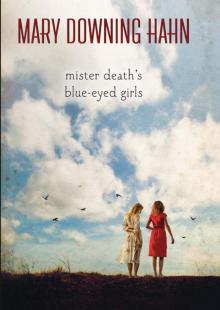 Mister Death's Blue-Eyed Girls
Mister Death's Blue-Eyed Girls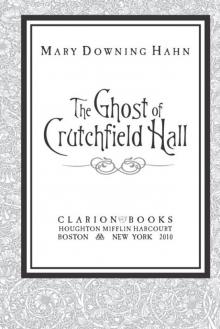 The Ghost of Crutchfield Hall
The Ghost of Crutchfield Hall Hear the Wind Blow
Hear the Wind Blow Time of the Witch
Time of the Witch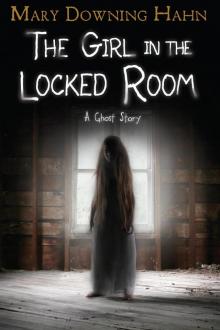 The Girl in the Locked Room: A Ghost Story
The Girl in the Locked Room: A Ghost Story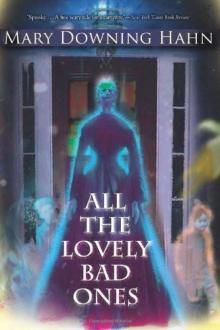 All the Lovely Bad Ones
All the Lovely Bad Ones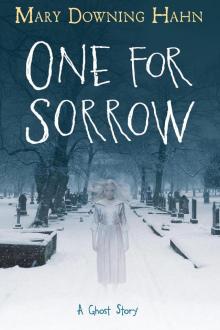 One for Sorrow
One for Sorrow Deep and Dark and Dangerous
Deep and Dark and Dangerous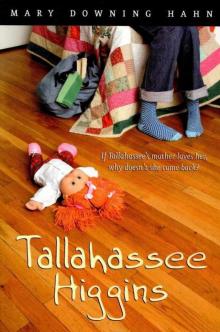 Tallahassee Higgins
Tallahassee Higgins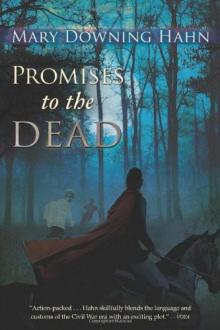 Promises to the Dead
Promises to the Dead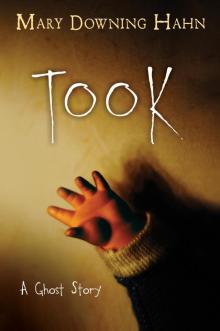 Took: A Ghost Story
Took: A Ghost Story Following My Own Footsteps
Following My Own Footsteps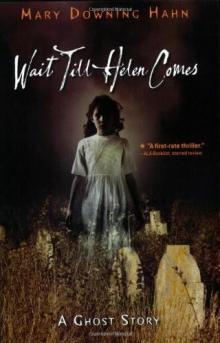 Wait Till Helen Comes: A Ghost Story
Wait Till Helen Comes: A Ghost Story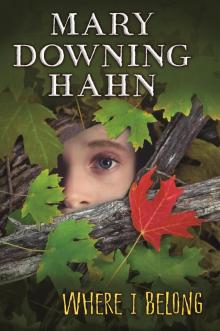 Where I Belong
Where I Belong The Spanish Kidnapping Disaster
The Spanish Kidnapping Disaster Look for Me by Moonlight
Look for Me by Moonlight The Old Willis Place
The Old Willis Place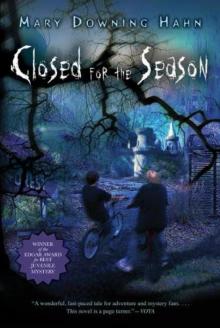 Closed for the Season
Closed for the Season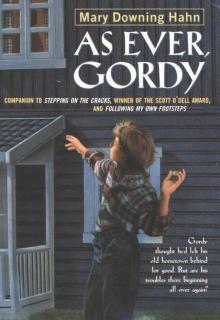 As Ever, Gordy
As Ever, Gordy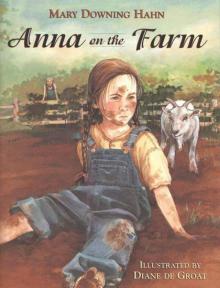 Anna on the Farm
Anna on the Farm The Doll in the Garden
The Doll in the Garden Daphne's Book
Daphne's Book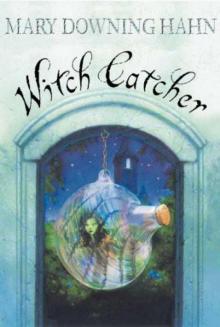 Witch Catcher
Witch Catcher The Gentleman Outlaw and Me--Eli
The Gentleman Outlaw and Me--Eli Wait Till Helen Comes
Wait Till Helen Comes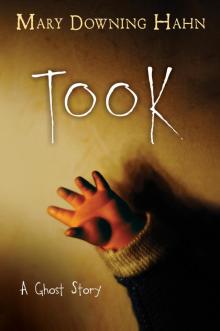 Took
Took A Haunting Collection
A Haunting Collection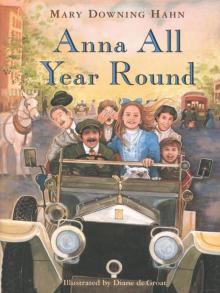 Anna All Year Round
Anna All Year Round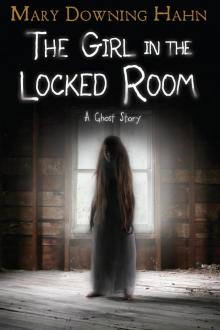 The Girl in the Locked Room
The Girl in the Locked Room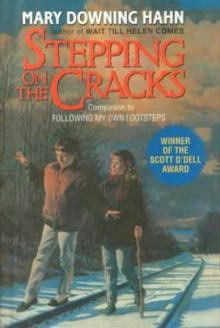 Stepping on the Cracks
Stepping on the Cracks